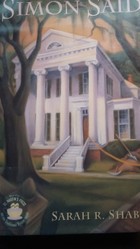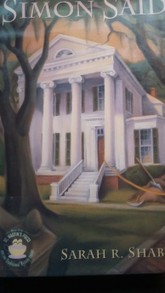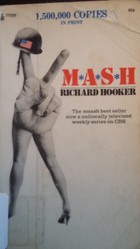Synopsis: In 1926, railroad heiress Anne Bloodworth disappeared without a trace. An investigation turned up no leads but many of her friends believed she ran away with a lover to avoid an arranged marriage. However, roughly 70 years later, an archaeological dig on the family's property turns up Anne's body. After police determine she was murdered but show limited interest in solving the case, Pulitzer Prize-winning professor Dr. Simon Shaw decides to figure out who her killer was. Unfortunately for him, digging into her past may also put his own life at risk.

Book Review: Simon Said (1997)
by StevenHelmer
A review of the 1997 murder mystery written by Sarah R. Shaber.
Review
As I've mentioned before, I've gotten into the habit of picking out a book at random whenever I'm at our public library, mostly as a way of forcing myself to try authors I wouldn't normally read. That happened to be this book the last time I was there.
When I first picked this one out, I was admittedly intrigued. As a former history major, the idea of a historian trying to solve a murder that took place before he was born seemed interesting. Unfortunately, as I read the book, I found I just wasn't into it as I hoped to be. I won't say I hated it. But, I just didn't like it as much as I thought I would.
I'll start out by saying I did find I liked the various characters in this book. I thought Simon Shaw was likable and a bit unique. And, the fact he was going through a rough patch in his life, to the point he was on anti-depressants did humanize him a bit more than some other literary detectives I've read about.
The various other characters in the book, especially those he meets while working with the police department, were also fun to read about. In fact, I haven't ruled out reading the second book in this series as a result of that.
I think my biggest problem with this book is the mystery he was solving just seemed a bit bland. A large part of the reason, in my opinion at least, was the fact there were no present-world consequences for him solving Anne Bloodworth's murder. The book itself pretty much established as much by pointing out her murderer was either dead or very, very old.
As a result, when Simon's own life was in danger, it wasn't overly difficult to figure out the motive for the murder attempts and who was behind them. If anything, the attempts were more humorous than suspenseful, which isn't something that I'm looking for when reading a murder mystery.
Personally, I would have liked to have seen the overall murder mystery done a bit differently, with Anne Bloodworth's unsolved murder being connected to a new copy-cat-like serial killer and Simon being called in to find the link. That way, there would be the potential for the police to actually be involved (rather than just humoring him) and some legitimate danger for the hero whenever he discovered a clue that leads him closer to the present-day killer.
 | Simon Said Winner of the Malice Domestic/St. Martin's Press Best First Traditional Mystery Award Forensic historian Simon Shaw likes his murders old and cold, and his first case fits the b... |
Final Opinion
As I said, I didn't necessarily hate this book and, because I did find I liked the various characters, would consider reading another book in this series before making a final decision. However, there is just too much of this book that takes place in the past and, because of that, isn't as exciting as I hoped it would be.
My Grade: C
More By This Writer
 | Love Poems for My Wife When Steve first met Cynthia back in 2000, he knew she was the woman for him and proposed to her just three months after their first date.Married to her since 2003, he has often... |
You might also like
Book Review: MASH: A Novel About Three Army Doctors (1968)A review of the 1968 Richard Hooker novel that inspired both a movie and a te...
Book Review: Murder on the Orient Express (1934)A review of the 1934 mystery novel written by Agatha Christie.







 Law & Order: Special Victims Unit Episode Review: The Long Arm of the Witnesson 01/22/2021
Law & Order: Special Victims Unit Episode Review: The Long Arm of the Witnesson 01/22/2021
 Review of Walker Pilot Episodeon 01/22/2021
Review of Walker Pilot Episodeon 01/22/2021
 Review of Luige's Western Omelette Pizzaon 01/21/2021
Review of Luige's Western Omelette Pizzaon 01/21/2021
 Review of Michelina's Chocolate Fudge Brownieon 01/16/2021
Review of Michelina's Chocolate Fudge Brownieon 01/16/2021



Comments
StevenHelmer, Thank you for product lines, pretty pictures and practical information.
Is it that there was no readily retrievable evidence from the body and the grave? It seems a bit strange that police wouldn't be interested in solving a crime. But perhaps it would go on a pile for whenever they get through their current, open, pressing files.